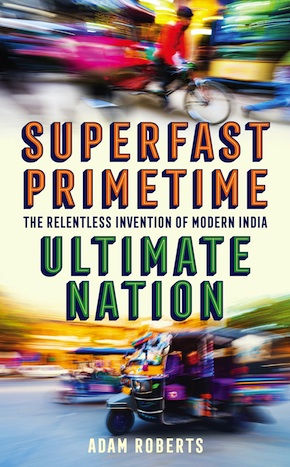The wisdom of parrots
by Adam Roberts
“An enjoyable romp across the subcontinent.” The Times
Govind Puri, in south Delhi, is home to the modestly aspirational. People move through its alleys with a sense of purpose. Young men press by on motorbikes; screechy horns announce their arrival. Acrid fumes linger. Uniformed children bustle past. Houses are neat but ramshackle, their ceilings low. In the tiny, single-roomed home of Bhim Joshi, one’s eyes need a moment to adjust after the bright sunshine outside. It contains one bed, one chair, and one low-energy bulb dangling from a cord. A fan blows hot dust onto blue walls.
Mr Joshi, in a pressed white shirt and trousers, has been a fortune-teller for thirty of his forty-five years. It is the family trade. He gestures to two cages each containing a parrot, explaining that “only one is effective,” then places a green bird on his bed. I pass him a bundle of rupees as Indrani, my assistant and translator, immediately points out I have overpaid, as ever. The bird’s work is disappointing and brief. In a blur it pecks at something among twenty playing cards spread on the bed. “What does he say about India’s future?” I ask. Unhappily, the bird has picked a scrap of paper, not a card. Worse, Mr Joshi explains, Saturn is stubbornly unhelpful. He foresees “a little trouble, but India will get support. The economy is in difficulties but will revive.” He cheers up: “Then India’s place in the world will be number one.” He switches from Hindi to English, repeating himself with a smile: “Number One!”
Mr Joshi says the stars ordain that India will become the greatest power on Earth. In national affairs, a drama is looming: the death of an elderly leader, the assassination of another, and the marriage of an important dynastic figure. Then India will emerge stronger, with sporting triumph and great riches. One of the birds begins to sing boldly. I ask about individual political leaders. Will Narendra Modi – at the time an ambitious regional politician – grow more powerful? Mr Joshi takes out a tatty almanac, with columns of dates, squiggles, and details of planetary comings and goings. He furrows his brow, purses his lips, and pretends to make a series of difficult calculations. Then a smile spreads. “He can become prime minister,” he assures me, spinning a yarn about Modi’s family business and great wealth. An hour later, wondering how different a reading by the defective bird might have been, we zigzag back through alleys, passing a stall with a griddle of sizzling meat.
As a foreign writer in India I had the best job in journalism, with freedom to explore a stimulating, thrilling, warm – if sometimes exasperating – country.”
Could Mr Joshi and his feathered assistant foresee the future by drawing on ancient wisdom, Vedic history, a spiritual understanding, and knowledge of the stars? Were their premonitions of fate divined from something rich and powerful, an astrological force that can be tapped in the sub-continent but lies beyond the reach of closed Western minds? Not at all. They were jovial entertainers who scratched a living by spinning plausible stories. Mr Joshi was a benign con-artist and charlatan, as likely to be right as anyone else, or as the flip of a coin.
Those who claim to intuit the future from reading the stars nonetheless get a respectful hearing in South Asia (and far beyond), including from the most powerful leaders. I once spent an entertaining morning in Galle, Sri Lanka, in a mansion with white marble floors whose owner was chief astrologer to Sri Lanka’s president. We munched on a breakfast of treacle pudding, the astrologer’s plate balanced on a bulging pot-belly, and he foretold for me the president’s lucky numbers. He also guaranteed the president a smashing victory in an election a few weeks away. It was a virtuoso performance in every respect but one: the president lost.
Looking back at Mr Joshi’s predictions, I find that most of them proved comically wrong. Perhaps he’d used the defective parrot. His promise that India, whose national football team was ranked 162nd in the world (behind tiny Barbados), would win the soccer World Cup turned out to be somewhat ambitious. India has never yet even attended the World Cup finals. He was wrong, too, to say that Mitt Romney would become America’s president. But the art of reading the future is to make many specific predictions, hope one turns out to be correct, and then celebrate it. Mr Joshi was spot on, for example, to say Modi would become prime minister. And his prediction that India would be big and powerful, “Number One,” was not entirely fanciful. By the 2020s it will indeed be the most populous country on Earth. It has long been the largest democracy, and it is also gaining as an economic and military power. What would it take for India to prove Mr Joshi right? What is keeping his prophesy from coming true? I want India to succeed – not least because of the fun I have had, and the genuine welcome from Indians, during my several years as The Economist’s bureau chief in the country. Once I wrote a column for the Times of India, admitting that as a foreign writer in India I had the “best job in journalism,” with freedom to explore a stimulating, thrilling, warm – if sometimes exasperating – country, to throw myself into conversation with bright, friendly, and demanding people, and to witness a giant beginning to shake off at least some of its worst problems. I even relished joining television debate programs, usually with Karan Thapar, a master of current affairs discussion, or hosting and speaking at conferences, and admired how most Indians tolerate a foreigner who shares in discussions about their future. It felt – and it feels – as if India is moving through a period historians will judge as a time of substantial progress, on most scores, however frustrating it is that many problems linger. The thrill I have had from travelling, reporting, reading about, and discussing India is immense. The challenge of progressing faster and improving millions of lives is just as big.
Extracted from Superfast Primetime Ultimate Nation
 Adam Roberts spent five years as South Asia bureau chief for The Economist, based in Delhi. Previously he was Africa Correspondent for the same publication. He is now European Business Correspondent, based in Paris. Superfast Primetime Ultimate Nation: The Relentless Invention of Modern India is published by Profile Books.
Adam Roberts spent five years as South Asia bureau chief for The Economist, based in Delhi. Previously he was Africa Correspondent for the same publication. He is now European Business Correspondent, based in Paris. Superfast Primetime Ultimate Nation: The Relentless Invention of Modern India is published by Profile Books.
Read more
@ARobertsjourno

